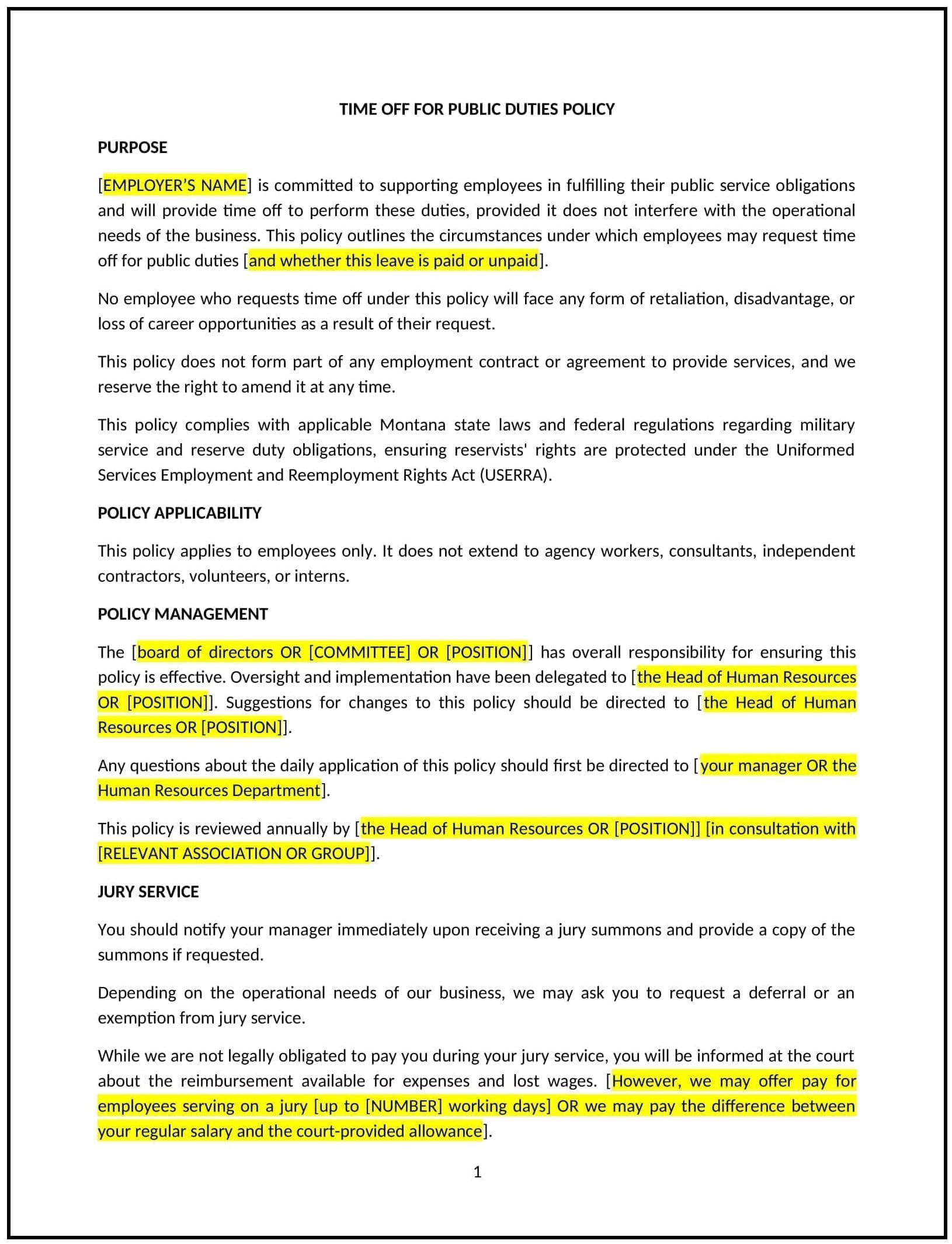Time off for public duties policy (Montana): Free template
Got contracts to review? While you're here for policies, let Cobrief make contract review effortless—start your free review now.

Customize this template for free
Time off for public duties policy (Montana)
A time off for public duties policy helps Montana businesses support employees who need time off to perform public service activities, such as jury duty, voting, or other government-related responsibilities. This policy outlines the guidelines for requesting time off, the procedures for documenting public duties, and how businesses will handle pay during such absences.
By implementing this policy, businesses demonstrate their commitment to civic responsibility, reduce the risk of legal complications, and ensure fair treatment of employees participating in public duties.
How to use this time off for public duties policy (Montana)
- Define public duties: The policy should clearly define what qualifies as a public duty, such as serving on a jury, voting in elections, or participating in government commissions or hearings.
- Set guidelines for requesting time off: Employees should be instructed to notify their employer in advance when they need time off for public duties, specifying the nature of the duty, the dates required, and any supporting documentation.
- Determine whether time off is paid or unpaid: The policy should specify whether employees will be paid for time spent on public duties or if the time off will be unpaid. The policy can also outline any allowances for partial pay or compensation during these absences.
- Address employee documentation requirements: Employees should be required to provide documentation of the public duty, such as a jury summons, voting schedule, or any official communication regarding their participation in government-related activities.
- Provide flexibility: The policy should allow employees to take reasonable time off for public duties without jeopardizing their position or job security, ensuring flexibility in managing work schedules during absences.
- Address the impact on work: The policy should outline how the business will manage workloads during employee absences, such as temporary reassignments, adjusted deadlines, or other accommodations to minimize disruption.
- Review and update regularly: The policy should be reviewed periodically to ensure it reflects any changes in local or state laws and business practices, and to accommodate the needs of both the business and its employees.
Benefits of using this time off for public duties policy (Montana)
This policy provides several key benefits for Montana businesses:
- Supports civic responsibility: A clear policy encourages employees to participate in public duties, such as jury service or voting, without the fear of losing income or facing job-related repercussions.
- Reduces legal risks: By offering time off for public duties, businesses can reduce the risk of legal claims or complaints from employees about being penalized for fulfilling civic responsibilities.
- Enhances employee satisfaction: Offering time off for public duties demonstrates that the business values its employees' civic engagement, increasing morale and fostering a positive workplace culture.
- Promotes work-life balance: The policy allows employees to balance their work obligations with their civic duties, supporting overall well-being and job satisfaction.
- Ensures fair treatment: The policy ensures that all employees are treated fairly when requesting time off for public duties, providing a consistent approach that applies equally to all eligible employees.
- Strengthens company reputation: A company that supports public service and encourages employees to participate in civic activities can enhance its reputation as a socially responsible employer.
Tips for using this time off for public duties policy (Montana)
- Communicate the policy clearly: Ensure that all employees are aware of the policy and understand how to request time off for public duties, including what documentation is required and the procedures for approval.
- Plan for absences: Ensure that business operations can continue smoothly during employee absences by planning ahead for workloads and coverage. This can include cross-training employees or adjusting deadlines as needed.
- Be flexible with scheduling: While the policy should set clear expectations, businesses should remain flexible in accommodating employees' schedules for public duties, ensuring that employees can fulfill their civic responsibilities without undue stress.
- Track time off: Maintain accurate records of time off taken for public duties to ensure consistency and fairness in applying the policy.
- Review the policy periodically: Review the policy to ensure it stays current with legal changes, business needs, and evolving employee expectations.